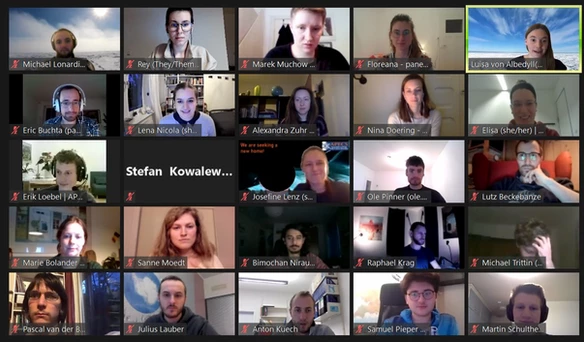At the occasion of the Polar Week 2021, APECS Germany organized a panel discussion and networking event on the 18th of March: “Let’s Talk Fieldwork”.
Despite the current situation, fieldwork is in the minds of early career polar researchers; it is very often a fundamental part of polar sciences as it allows the collection of samples and data that will be the basis of a research project – for example, a PhD thesis. However, it can be intimidating to go on the field, especially in an extreme environment, for the first time … “What should I bring? How is it to live with people for days? Am I gonna be cold?”. Thus, allowing the exchange of experience, knowledge, and tips, as well as helping early career researchers to be in contact with their peers, was our goal for “Let’s Talk Fieldwork”.
As a panel, six early-career scientists joined us to speak about their experience. We decided to introduce them from the South to the North pole:
- Eric Buchta: PhD Student at the Technische Universität Dresden, spoke about his fieldwork experience in Antarctica.
- Floreana Miesen: Field technician and junior researcher at Lausanne University. Invited to speak about her experience in mountain fieldwork.
- Alexandra Zuhr: PhD Student at the Alfred Wegener Institute (AWI) and co-chair of APECS Germany, invited to speak about her experience in Greenland.
- Nina Döring: Co-research Group Leader at the Institute for Advanced Sustainability Studies (IASS) and board member of APECS Germany, invited to speak about her experience doing fieldwork in the social sciences in Greenland.
- Marek Muchow: Master Student in remote sensing & sea-ice modeling at the University of Hamburg and co-chair of APECS Germany, invited to speak about his experience doing fieldwork in the North Atlantic on a cruise.
- Michael Lonardi: PhD student in Meteorology at Universität Leipzig. Invited to speak about his experience doing fieldwork in the Arctic Ocean
Led by Luisa von Albedyll as a moderator, they replied to questions from the organizers and the audience:

“What are the most memorable moments in the field?”
One aspect that stood out, especially for Eric during his fieldwork on the Antarctic ice sheet, is the absolute silence. With your research colleagues as the only source of noise, Antarctica can be one of the quietest places on Earth. Furthermore, he is very enthusiastic about that special feeling when finally bringing his hard-earned research data home. “But sometimes this is not that easy”, indicates Michael by explaining a story where one of his weather balloons deflated mid-air, damaging essential research equipment. Due to the extraordinary solidarity of his fellow expeditionists, this story had a happy ending as he was able to recover his instruments with their help.
“With temperatures reaching deep into the negatives, polar fieldwork can be incredibly challenging. How do you stay warm under these conditions?”
Besides the obvious like a hat, well-fitting gloves, and spare socks, Floreana recommends taking a Thermos (with Hot water or Tea) as well as a small insulated sitting pad. No more cold bums while sitting in the snow!
“We hear a lot about fieldwork preparation, and it seems to be a very important part of the process. Could you tell us more about your experience regarding fieldwork prep ?”
Depending on the region and scope of the project it might take several weeks up to a few years! Nina is a social scientist and spent an extended period of time in Greenland, engaging with people and studying political and administrative processes. In contrast to the natural sciences, her preparation includes establishing contacts, building relationships, and thoughtfully preparing for interviews.
“How do you deal with the same group of people 24/7 for weeks ?”
asked someone from the audience. Alexandra, who stayed at the EastGRIP camp in Greenland in 2018 and 2019, recommends bringing headphones, a good book, and spending some time by yourself. You might also catch some moments of peace by getting up early.
“It is sometimes told in science that doing fieldwork is not compatible with family life …”
Several panelists take opposition to this idea. Of course, planning fieldwork while having young children can be a lot of organization and is easier done for people who can rely on their relational circle -partners, family, friends. Nevertheless, one of the panelists related a story of his two supervisors bringing their babies on the field and nailing fieldwork and parenting at the same time. A member of the audience who lives with her family in Alaska, where she does fieldwork, also related her experience in the chat.
“So, how can I create fieldwork opportunities for myself?”
Marek, who has been part of multiple ship-based expeditions, explains that these fieldwork opportunities don’t come by themself and are often a product of a lot of personal engagement with the right people. Several panelists and members of the audience agree with him: be vocal about your desire to go on the field. You have to stay active and state your interest, especially if you are a student!
One last point where all our panelists agreed on is that polar fieldwork is both enjoyable and interesting, but also means a lot of effort. Free time is rare and there are no weekends off! In return, you have the opportunity to conduct important measurements, engage with people and their culture, learn new skills and live and work in one of the earth’s most remote regions.
For wrapping up the panel discussion board member Lena presented a comprehensive and concrete summary of where and how you can create fieldwork opportunities for yourself. Interested? Find our recommended starting points in this article.
Thanks so much for everyone joining and sharing your experiences with us!
